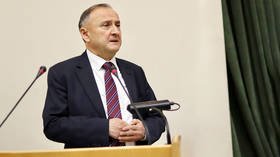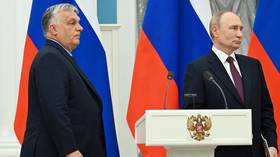Merkel defends Germany’s coronavirus response, says it’s not ‘dictatorship’-styled as in other countries
Chancellor Angela Merkel has defended her approach to tackling the coronavirus pandemic, stating that the country avoided “dictatorship”–style restrictions. Still, she admitted that the number of new infections remains “too high.”
Speaking at theBundestag on Wednesday, the chancellor lauded her flexible approach to the coronavirus crisis. Facing the second wave of the pandemic, the country has rolled out the so-called “lockdown lite” avoiding a complete shutdown.
“Our political action is different from what they do in countries that are more like a dictatorship,” Merkel told the parliament, stressing that the key to battling the outbreak is not bans but “the responsible behavior of each individual.”
Also on rt.com Saxony announces hard lockdown as German state becomes Covid-19 hotspotStill, Germany’s leader said that the number of new coronavirus infections remains far “too high.” Moreover, she admitted that the authorities would not be able to provide coronavirus vaccines to enough citizens in the first quarter of 2021 to cause a significant impact on the course of the pandemic.
The partial restrictions are expected to stay, as Merkel said she agreed with recommendations to close stores after Christmas until January 10. She also opposed opening hotels so that families can visit each other during holidays, stressing that Germans have failed to reduce their social contacts to a sufficient level. At the same time, the chancellor vowed to do everything possible to keep schools and kindergartens open.
The country has clocked more than 1.2 million cases since the beginning of the pandemic, including nearly 20,000 deaths, the latest statistics by the Robert Koch Institute shows.
Also on rt.com ‘Superspreading events under Christmas trees’: Germany urged to walk back planned easing of Covid-19 rules for holiday seasonWhile such figures put the country among the worst-hit nations in the world, they are still significantly lower than those of the ‘leaders’ – the US, India and Brazil. Those three countries account for nearly a half of about 68.2 million coronavirus cases registered globally.
Think your friends would be interested? Share this story!













